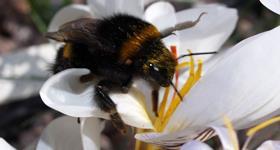
New research claiming that a decline in bee and wild-flower populations is slowing down has been backed by the NFU.
The study, which was compiled by a group of scientists from Europe (including researchers from Leeds and Reading Universities) and the US, claims there has been a dramatic reduction in the loss of pollinator populations in the UK over the last 20 years.
According to the study, the biodiversity of wild bees in the UK has increased 'significantly' in recent decades, with farmers integrating agri-environmental management strategies on a wide scale. The claims are contrary to the views of the British Beekeepers' Association, which says that the number of bee colonies in Great Britain fell by 16 per cent last year.
Professor Bill Kunin, professor of Ecology at the University of Leeds, was one of the scientists who helped to compile the research. He said: “Most observers have been saying that the 1992 Rio Earth Summit targets to slow biodiversity loss by 2010 failed, but what we are seeing is a significant slowing or reversal of the declines for wild plants and their insect pollinators.”
On its website - within a post discussing the research titled 'Signs of a bee recoveryshould have us all buzzing' - the NFU criticises the media for'preferring to talk about bees as though they are on the edge of apocalyptic declines,' in the wake of three neonictionoids being banned by the EU back in Aprilafter being deemed too dangerous towards pollinator populations. The verdict followed a decision by Waitrose to ban the use of all neonicotinoid pesticides among its fruit and vegetable growers.



